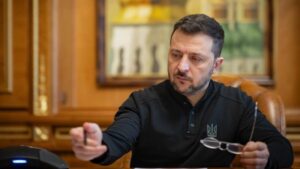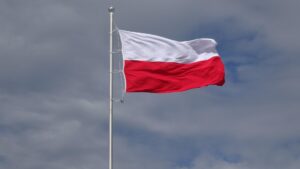
According to Serbian Economist, Serbia and Ukraine are intensifying cooperation in agriculture, trade, and technology exchange.
The Serbian side confirmed its interest in expanding imports of Ukrainian agricultural products, especially corn, wheat, oilseeds, and semi-finished products for the food industry. At the same time, they discussed increasing supplies of Serbian goods to the Ukrainian market, including meat, dairy products, feed, and planting material.
According to the Serbian Ministry of Agriculture, Kyiv and Belgrade are considering the possibility of creating joint logistics corridors that would allow them to bypass existing transit restrictions and speed up the movement of goods between the countries. Special attention was paid to the topic of plant protection, veterinary standards, and simplifying certification procedures for producers in both countries.
The parties also noted the potential for cooperation in the development of digital agriculture and agrotechnologies. Ukraine offered Serbian companies an exchange of practices on the use of drones, remote monitoring systems, and AI analytics to optimize agricultural production. The Serbian delegation, in turn, expressed its willingness to share its experience in organic farming and agricultural raw material processing.
During the meeting, the prospects for Serbian companies’ participation in programs to restore Ukraine’s agricultural infrastructure, including the modernization of grain storage, processing facilities, and logistics, were also discussed.
The negotiations are taking place against the backdrop of growing trade turnover: in recent years, the volume of bilateral trade in agricultural products has shown steady growth, and Serbia is becoming one of Ukraine’s key Balkan partners in the region.
The next meeting of the relevant ministries is expected to take place in early 2026, where the parties plan to present a roadmap for deepening cooperation in the agricultural sector.

On Thursday, an official ceremony was held at the presidential administration in Bishkek, attended by the head of state, Sadyr Zhaparov. During the event, participants symbolically pressed the launch button, after which 50 million USDKG tokens were released into circulation on the Tron network, each of which corresponds to one US dollar and is fully backed by gold reserves.
According to the report, USDKG is designed as a transparent, secure, and stable digital currency that combines the reliability of gold with the efficiency of blockchain technology. The launch of the stablecoin should strengthen Kyrgyzstan’s position in the global financial ecosystem and lay the foundation for the development of Web3 infrastructure and decentralized services through which government agencies and businesses will be able to interact based on blockchain solutions.
The presidential administration notes that the new instrument is designed to increase the country’s investment attractiveness by creating conditions for capital inflows and technological partnerships. The authorities expect that the availability of a stablecoin backed by real assets will strengthen confidence in financial innovations and demonstrate the possibility of combining digital tools with material support in the interests of sustainable economic development.
The issuer of USDKG is JSC “Virtual Asset Issuer” with 100% state participation. The ceremony was attended by Kyrgyzstan’s Minister of Finance Almaz Baketaev and the company’s CEO Biibolot Mamitov, as well as representatives of the Gold Dollar project, who are involved in the technical and international aspects of the stablecoin’s implementation. In official materials, the project is positioned as the world’s first state-owned stablecoin backed by physical gold and pegged to the US dollar.

Timur Mindich and Alexander Zuckerman, suspects in the Midas case who are suspected of committing corruption crimes, have been declared wanted. The relevant data appeared in the Ministry of Internal Affairs database on November 22.
The suspects’ profiles are listed in the section “Persons hiding from pre-trial investigation authorities.” Mindich’s date of disappearance is listed as November 10, 2025, and Zuckerman’s as October 26, 2025.

Ukrainian President Volodymyr Zelensky has formed a delegation to participate in negotiations with the United States and other international partners of Ukraine, as well as with representatives of the Russian Federation. The delegation will be headed by the head of the President’s Office, Andriy Yermak.
Decree No. 854/2025, signed on November 22, “On the Ukrainian delegation to participate in the negotiation process with the United States of America and other international partners of Ukraine, as well as with representatives of the Russian Federation, to achieve a just and sustainable peace,” is posted on the website of the Office of the President.
The delegation consists of nine high-ranking officials, including the head of the delegation, Head of the Office of the President Andriy Yermak, Secretary of the National Security and Defense Council of Ukraine Rustem Umerov, and Head of the Main Intelligence Directorate of the Ministry of Defense of Ukraine Kirill Budanov. It also includes Chief of the General Staff of the Armed Forces of Ukraine Andriy Hnatov, Chairman of the Foreign Intelligence Service of Ukraine Oleg Ivashchenko, First Deputy Minister of Foreign Affairs of Ukraine Serhiy Kyslytsya, First Deputy Secretary of the National Security and Defense Council of Ukraine Yevhen Ostryansky, Deputy Chairman of the Security Service of Ukraine Oleksandr Poklad, and Advisor to the Head of the Office of the President of Ukraine Oleksandr Bevz.
According to the decree, Yermak, as head of the delegation, is authorized to make changes to the composition of the Ukrainian delegation in agreement with the President of Ukraine; to involve, in accordance with the established procedure, employees of state bodies, enterprises, institutions, organizations (in agreement with their heads), scientific advisers, and experts (with their consent) to ensure the work of the Ukrainian delegation.

The Temporary Investigation Commission is trying to determine whether there was influence on the Public Integrity Council, but the key witness refuses to appear before the Verkhovna Rada.
An attempt was made to forcibly bring Mikhail Zhernakov, head of the DEJURE Foundation, to a meeting of the Verkhovna Rada’s Temporary Investigation Commission on the investigation of possible corruption or corruption-related offences in law enforcement agencies, courts, and judicial authorities, known in the media as the “Vlasenko-Buzhansky Commission.”
The summons was related to the fact that the TSC is trying to determine whether the DEJURE Foundation and Mikhail Zhernakov personally influenced the formation and activities of the Public Integrity Council. The latter plays a certain role in judicial reform, as it was intended to exercise public control over the integrity of candidates for judicial power.
For example, on November 4, the TSK questioned Tatyana Katrichenko, co-author of a column in Ukrainska Pravda, but did not receive any specific answers from her. Mikhail Zhernakov could not be questioned because he did not attend the TSK meeting at all.
Zhernakov himself complained that the National Police tried to break into his house and claimed that the TSK does not have the authority to summon public activists or conduct investigations against them, and allegedly “set out to attack independent institutions and public organizations that are cleaning up the system.”
In addition, he said that he had a more important reason for not attending the Verkhovna Rada, namely that he was going to a “high-level meeting.”
All events took place in the elite Elyseum residential complex, where, according to media reports, the cheapest apartment costs about $160,000 without renovation.
The next meeting of the TSK will take place on November 24, 2025, and the agenda item to be considered is the presence of signs of abuse of influence and other possible corruption offenses in the formation and activities of the third and fourth compositions of the Public Integrity Council.
What is Mikhail Zhernakov known for?
Career as a judge
In 2012, then-President Viktor Yanukovych appointed him judge of the Vinnitsa District Administrative Court. On September 30, 2013, the High Qualification Commission of Judges recommended him for permanent transfer to the position of judge of the District Administrative Court of Kiev.
According to the Judicial and Legal Newspaper, Mikhail Zhernakov was absent from work for 449 (!) days between 2012 and 2015. For example, from January to September 2015, he considered only 76 administrative cases.
In July 2015, he submitted his resignation from the position of judge at his own request.
Evasion of military service
According to media reports, on December 14, 2023, Mikhail Zhernakov was detained in Kyiv by officers of the TCC and SP and forcibly taken to the Shevchenkivskyi District TCC and SP. The reason was a violation of the rules of military registration for conscripts.
A report was drawn up against Zhernakov under Part 2 of Article 210-1 (violation of legislation on defense, mobilization preparation, and mobilization) of the Code of Administrative Offenses.
Zhernakov did not contest the actions of the TCC and on December 20, 2023, paid a fine of 5,300 hryvnia.
Later, he got a job as an expert at the Ministry of Defense’s “Office of Change.”
At the same time, back in June 2023, Zhernakov tried to get a ‘deferral’ — he got a job at the private higher education institution “Kyiv School of Economics” (KSE) at 0.75 of the standard rate.
When information about his “research and teaching activities” became public in December of the same year, a scandal erupted. The rector of KSE had to comment publicly on the situation, stating that if Zhernakov was mobilized, KSE would not object and “would wait for his return.”
– A conflict with Dmitry Krivenko, a judge of the Lipovetsky District Court of the Vinnytsia region, which arose from the story of December 15, 2021, involving judges of the Shevchenko District Court of Zaporizhia, who celebrated Court Workers’ Day in a cafe to the sound of chanson music. In January 2022, a video of the incident was posted online, after which the judges received a wave of criticism.
– Interference in the election of the head of the Supreme Court.
– Colleagues in the “civil sector” accused him of manipulating the election of members of the Public Integrity Council, promoting candidates who were personally beneficial to him to the PIC (“Zhernakov’s lists”), putting pressure on certain members of the public, intrigue, slander, “usurpation of power,” and even financial fraud involving foreign donor funds that were intended to “support judicial reform in Ukraine.”
Some critics even claimed that there may have been financial irregularities in the use of donor funds received to support judicial reform. There is no public confirmation of these allegations, and Zhernakov himself denies them.

As part of the Prioritized Ukraine Requirements List (PURL) program, Poland will allocate $100 million for the purchase of American weapons for Ukraine. The purchases will be financed from the budget of the Polish Ministry of Foreign Affairs, said the head of the ministry, Radosław Sikorski.
“Europe’s security will be enhanced or diminished as a result of how this war ends,” Sikorski stressed, according to Polsat News.
As reported, the initiative to finance the purchase of American weapons for Ukraine came after the US administration refused to continue supplying weapons to Kyiv free of charge. In August, four packages of American weapons were prepared for a total amount of about $2 billion. The funding was provided by Germany, Denmark, Canada, the Netherlands, Norway, and Sweden.
On August 15, at a meeting of NATO defense ministers in Brussels, Estonia, Latvia, Lithuania, Belgium, Luxembourg, Finland, and Iceland announced their decision to join the program to finance Ukrainian defense orders within the framework of the NATO initiative “Priority Urgent Requirements List for Ukraine” (PURL).
On October 23, Spain announced its agreement to join the PURL project in response to renewed criticism from US President Donald Trump regarding Spain’s unwillingness to increase military spending.